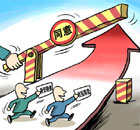Society
CPC flexes muscles to combat corruption
(Xinhua)
Updated: 2010-01-13 02:10
 |
Large Medium Small |
BEIJING: China was flexing its muscles to fight corruption which was still an "persistent, complicated and arduous" task, said an expert as the internal anti-graft body of the Communist Party of China (CPC) convened its three-day plenary session.
President Hu Jintao told the meeting of the CPC Central Commission for Discipline Inspection (CCDI) that the Party should "fully recognize the situation of the fight against corruption," which was "persistent, complicated and arduous."
Last year, at least 15 ministerial or provincial level officials, including heads of State-owned enterprises (SOE), were investigated for corruption, nine of whom were referred for prosecution, the CCDI said.
| ||||
"The graft fight and the promotion of a clean and honest work among Party cadres has a great bearing on the Party's survival," Prof. Huang Zongliang of Beijing University told Xinhua.
Huang said despite the arrests of many high-ranking officials, the graft situation did not "show any sign of relaxation," citing the 2009 corruption index of the Transparency International, a Berlin-based non-government organization.
Among the annual ranking of the world's countries and regions of 180, China ranked 72nd. Countries and regions towards the end of the list means more corrupt.
Huang said China's ranking was low and there was little progress compared with that of previous years.
Asset reporting system in the pipeline
He said to build a system of officials' asset reporting was an effective way to prevent corruption.
The communique of the last CCDI plenary session in September said officials should "report their properties and investment as well as employment of their spouse and children," and authorities should enhance management of officials who had family members living overseas.
Such requirement was in response to several cases of corrupt officials who fled the country with huge amount of public funds.
Huang said the public applauded the move to set up an officials' assets declaration system, as it signaled the Party's effort in pushing for transparency.
Currently, the program has been tested in several regions, including eastern Zhejiang and Shanghai and far western Xinjiang.
At the CCDI's plenary session Tuesday, Hu, also general secretary of the CPC Central Committee, said supervision and monitoring should be enhanced to form an effective corruption prevention system.
Vice Minister of Supervision Qu Wanxiang also pledged last week to tighten supervision on the SOEs and fight corruption among their executives.
At least 35 senior executives of China's large SOEs faced corruption charges last year, said a report by Faren Magazine, affiliated to the Legal Daily and overseen by the Ministry of Justice.
Among them was Kang Rixin, general manager of the China National Nuclear Corporation (CNNC), who has been under investigation for alleged grave violations of Party discipline since August.
Another prominent case involved Chen Tonghai, former chairman of China's state-run oil refiner Sinopec, who was found to have taken almost 200 million yuan ($29.4 million) in bribes and given a death sentence with a two-year reprieve in July.
Latest statistics show more than 106,000 officials in China were penalized for disciplinary violations from January to November last year.
President Hu vowed that no corrupt official would be above the law and Party discipline.











